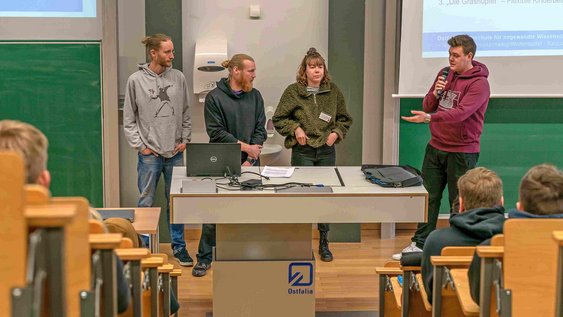Social Work Wolfenbüttel
Are you interested in working with people? Do you want to support and make a difference with your personality?
Would you like to support people in difficult life situations and with psycho-social problems and contribute to a better quality of life and social justice? Then the Bachelor's degree programme in Social Work is just right for you!
Facts at a glance
Successfully enrolled?
Want to know what to do next? We'll help you get started with your studies!
Information for first semester studentsImportant information about the start of the programme & capacity limit winter semester

Thank you for your great interest in our Bachelor's degree programme in Social Work! We have reached our capacity limit for the coming winter semester, which is why it is unfortunately no longer possible to apply.
The programme will start again next summer semester - we look forward to receiving your application!
Are you already successfully enrolled? Congratulations! You can find the most important links here to ensure a smooth start to your studies:
Typical professional fields of activity
- General social services
- Parental/family counselling and family education
- Child and youth welfare and youth work
- School social work
- Elderly care and work with senior citizens
- Work with people with disabilities and integration assistance
- Migration counselling, work with refugees
- Social counselling and company social work
- Drug help and addiction counselling
- Homelessness counselling
- Offender and probation counselling
- Protection against violence, counselling centres for victim-offender mediation, women's shelters
- Political education and democracy promotion
- Social psychiatric services
- Health-related social work and social services
- Hospice work
- International development cooperation
- sustainable and transformative social work
- Neighbourhood-oriented community work
Important study contents
Modules of the study programme
- Social work (introduction, social work science, profession)
- Concepts of action and methods
- Social work and the world of work
- Target groups and fields of action in social work
- Social science basics
- Psychology
- Law
- Pedagogy
- Gender, diversity and inclusion
- Health and participation
- Media science / media education
- Economics and organisation
- Ethics and social philosophy
- Social and project management
- Project workshop
- Scientific work
- Research in social work
- Research workshop
- Transnational and intercultural social work
- New questions in social work
- Social Work Generale
Study plan
1. Semester [M1.1] Social Work 1 - Introduction (1. Semester) Competence goals
Graduates are familiar with the historical development of social work and social pedagogy and understand social work as an independent discipline and profession. They have a basic understanding of central definitions in national and international discourse and are aware of the special professional ethical obligation that requires them to reflect on their own professional actions.
Contents of the module
The module traces the historical lines of development and convergence debates of social pedagogy and social work and illuminates the development towards an independent science. Central definitions (e.g. those of IFSW), subject definitions, the social function and the dual mandate of social work are dealt with. In addition, ethical aspects and the reflection of one's own values and norms are introduced.
[M1.2] Introduction to scientific work (1. Semester) Competence goals
Graduates have practical strategies and reflective competences for dealing with information and knowledge. They will be able to define relevant information requirements, use digital methods to obtain information and present the results of academic research in a targeted manner. They have mastered the basics of academic work that enable independent, lifelong learning and can identify their own needs for further education.
Contents of the module
The module teaches the basics of scientific theory and important concepts of scientific work and thinking. Students learn how to deal with literature and produce academic texts. In the "self-directed learning" part, students identify their support needs and put together an individual continuing education programme from the university's offerings (e.g. library, writing workshop, career service).
[M1.3] Introduction to the fields of action of social work (1. Semester) Competence goals
Students have knowledge of institutions, organisations and providers of social work. They gain insights into the wide range of fields of action, deal with social problems and learn how to deal with the typical contradictions of the profession. They also develop self-organisation and reflection skills.
Contents of the module
The lecture provides an overview of the structures of the welfare sector, target groups and fields of action. The accompanying exercise deepens this content, prepares students for the practical phases and reflects on the self-organised work shadowing.
[M1.4] Social Science Principles of Social Work I (1. Semester) Competence goals
Students acquire a basic understanding of central concepts and theoretical approaches in sociology and social policy. They will be able to relate social and political phenomena to each other and categorise the acquired knowledge in the context of social work activities.
Contents of the module
The lecture on sociology introduces basic concepts such as social action, inequality and power. The lecture on social policy deals with topics such as the history of the welfare state, political decision-making processes and the role of social movements. The aim is to understand the conditions under which social problems arise.
[M1.5] Pedagogy (1. Semester) Competence goals
Students learn about the entire spectrum of pedagogy and acquire knowledge about pedagogical professions and their historical foundations. They will be able to describe the terms socialisation, upbringing, education and learning and relate them to socio-educational fields of action. They are able to critically scrutinise everyday pedagogical phenomena and develop their own professional attitude.
Contents of the module
The lecture provides access to the basic concepts and findings of pedagogy. In the seminar, a pedagogical sub-discipline (e.g. social pedagogy, curative education, experiential education) is examined in depth, focussing on its theories and its relationship to social work.
[M1.6] Law (1. Semester) Competence goals
Students have legal access to key fields of work, recognise the importance of legal structures as a foundation for professional action and are able to distinguish between the main features of public and private law. They learn the ability to apply the instruments of administrative law in social law in order to plan and manage social work.
Contents of the module
The "Law and Social Work" part teaches the social significance of law, the German legal system and specific professional obligations. The "General Social Law" part deals with the basic principles of social law and the course of an administrative procedure under social law.
[M1.1] Social Work 1 - Introduction (1. Semester) Competence goals
Graduates are familiar with the historical development of social work and social pedagogy and understand social work as an independent discipline and profession. They have a basic understanding of central definitions in national and international discourse and are aware of the special professional ethical obligation that requires them to reflect on their own professional actions.
Contents of the module
The module traces the historical lines of development and convergence debates of social pedagogy and social work and illuminates the development towards an independent science. Central definitions (e.g. those of IFSW), subject definitions, the social function and the dual mandate of social work are dealt with. In addition, ethical aspects and the reflection of one's own values and norms are introduced.
Competence goals
Graduates are familiar with the historical development of social work and social pedagogy and understand social work as an independent discipline and profession. They have a basic understanding of central definitions in national and international discourse and are aware of the special professional ethical obligation that requires them to reflect on their own professional actions.
Contents of the module
The module traces the historical lines of development and convergence debates of social pedagogy and social work and illuminates the development towards an independent science. Central definitions (e.g. those of IFSW), subject definitions, the social function and the dual mandate of social work are dealt with. In addition, ethical aspects and the reflection of one's own values and norms are introduced.
[M1.2] Introduction to scientific work (1. Semester) Competence goals
Graduates have practical strategies and reflective competences for dealing with information and knowledge. They will be able to define relevant information requirements, use digital methods to obtain information and present the results of academic research in a targeted manner. They have mastered the basics of academic work that enable independent, lifelong learning and can identify their own needs for further education.
Contents of the module
The module teaches the basics of scientific theory and important concepts of scientific work and thinking. Students learn how to deal with literature and produce academic texts. In the "self-directed learning" part, students identify their support needs and put together an individual continuing education programme from the university's offerings (e.g. library, writing workshop, career service).
Competence goals
Graduates have practical strategies and reflective competences for dealing with information and knowledge. They will be able to define relevant information requirements, use digital methods to obtain information and present the results of academic research in a targeted manner. They have mastered the basics of academic work that enable independent, lifelong learning and can identify their own needs for further education.
Contents of the module
The module teaches the basics of scientific theory and important concepts of scientific work and thinking. Students learn how to deal with literature and produce academic texts. In the "self-directed learning" part, students identify their support needs and put together an individual continuing education programme from the university's offerings (e.g. library, writing workshop, career service).
[M1.3] Introduction to the fields of action of social work (1. Semester) Competence goals
Students have knowledge of institutions, organisations and providers of social work. They gain insights into the wide range of fields of action, deal with social problems and learn how to deal with the typical contradictions of the profession. They also develop self-organisation and reflection skills.
Contents of the module
The lecture provides an overview of the structures of the welfare sector, target groups and fields of action. The accompanying exercise deepens this content, prepares students for the practical phases and reflects on the self-organised work shadowing.
Competence goals
Students have knowledge of institutions, organisations and providers of social work. They gain insights into the wide range of fields of action, deal with social problems and learn how to deal with the typical contradictions of the profession. They also develop self-organisation and reflection skills.
Contents of the module
The lecture provides an overview of the structures of the welfare sector, target groups and fields of action. The accompanying exercise deepens this content, prepares students for the practical phases and reflects on the self-organised work shadowing.
[M1.4] Social Science Principles of Social Work I (1. Semester) Competence goals
Students acquire a basic understanding of central concepts and theoretical approaches in sociology and social policy. They will be able to relate social and political phenomena to each other and categorise the acquired knowledge in the context of social work activities.
Contents of the module
The lecture on sociology introduces basic concepts such as social action, inequality and power. The lecture on social policy deals with topics such as the history of the welfare state, political decision-making processes and the role of social movements. The aim is to understand the conditions under which social problems arise.
Competence goals
Students acquire a basic understanding of central concepts and theoretical approaches in sociology and social policy. They will be able to relate social and political phenomena to each other and categorise the acquired knowledge in the context of social work activities.
Contents of the module
The lecture on sociology introduces basic concepts such as social action, inequality and power. The lecture on social policy deals with topics such as the history of the welfare state, political decision-making processes and the role of social movements. The aim is to understand the conditions under which social problems arise.
[M1.5] Pedagogy (1. Semester) Competence goals
Students learn about the entire spectrum of pedagogy and acquire knowledge about pedagogical professions and their historical foundations. They will be able to describe the terms socialisation, upbringing, education and learning and relate them to socio-educational fields of action. They are able to critically scrutinise everyday pedagogical phenomena and develop their own professional attitude.
Contents of the module
The lecture provides access to the basic concepts and findings of pedagogy. In the seminar, a pedagogical sub-discipline (e.g. social pedagogy, curative education, experiential education) is examined in depth, focussing on its theories and its relationship to social work.
Competence goals
Students learn about the entire spectrum of pedagogy and acquire knowledge about pedagogical professions and their historical foundations. They will be able to describe the terms socialisation, upbringing, education and learning and relate them to socio-educational fields of action. They are able to critically scrutinise everyday pedagogical phenomena and develop their own professional attitude.
Contents of the module
The lecture provides access to the basic concepts and findings of pedagogy. In the seminar, a pedagogical sub-discipline (e.g. social pedagogy, curative education, experiential education) is examined in depth, focussing on its theories and its relationship to social work.
[M1.6] Law (1. Semester) Competence goals
Students have legal access to key fields of work, recognise the importance of legal structures as a foundation for professional action and are able to distinguish between the main features of public and private law. They learn the ability to apply the instruments of administrative law in social law in order to plan and manage social work.
Contents of the module
The "Law and Social Work" part teaches the social significance of law, the German legal system and specific professional obligations. The "General Social Law" part deals with the basic principles of social law and the course of an administrative procedure under social law.
Competence goals
Students have legal access to key fields of work, recognise the importance of legal structures as a foundation for professional action and are able to distinguish between the main features of public and private law. They learn the ability to apply the instruments of administrative law in social law in order to plan and manage social work.
Contents of the module
The "Law and Social Work" part teaches the social significance of law, the German legal system and specific professional obligations. The "General Social Law" part deals with the basic principles of social law and the course of an administrative procedure under social law.
Pre-internship
The pre-study internship introduces you to the activities of professional social work, the aim of which is to deal with problems that are considered socially and professionally relevant.
During the 12-week full-time pre-study internship, you will have the opportunity to familiarise yourself with working with people (the field of social work) under the guidance of a social worker. And then expand and deepen your knowledge during your studies.
If certain requirements are met (e.g. FSJ, Federal Voluntary Service, voluntary work, educator training), the pre-study internship can be recognised.
Alternatives
- relevant, completed vocational training of at least two years (e.g. educator, social assistant, curative education nurse, (paediatric) nurse, geriatric nurse, occupational therapist)
- voluntary work in one of the fields of social work (at least 420 hours, within the last 5 years prior to application)
- at least 6 months of voluntary service (voluntary social year, federal voluntary service) in one of the fields of social work
- at least 12 months (full-time) of social work experience without a vocational qualification in a relevant field of activity (if the work experience lasts at least 6 months, the pre-study work placement is reduced to 6 weeks. Part-time activities will be charged accordingly)
Possible areas of work / relevant fields of activity:
The pre-study work placement must be completed in a relevant field of social work/social pedagogy. These include, among others
- Municipal youth welfare (e.g. leisure centres);
- associational child and youth work (e.g. church youth work, children's aid organisations);
- in-patient youth welfare (e.g. children's and young people's homes, taking into care); disability support; work in socially deprived areas and/or with people at risk of social exclusion (e.g. migrants, homeless people, street children).
During the internship, supervision should be provided by a social worker/social education specialist or a person with comparable qualifications (usually proven by a university degree). The internship should be completed in one place.
Contents / evidence:
The internship should provide the intern with as comprehensive an insight as possible into the tasks typical of social work practice. The pre-study internship introduces students to professional social work activities aimed at dealing with problems that are considered socially and professionally relevant.
The university provides the form "Certificate of a completed pre-study work placement" as proof of the pre-study work placement (see Ostfalia homepage or faculty pages).
Pre-internship
The pre-study internship is your first important experience in social work and a prerequisite for enrolment. It gives you the chance to immerse yourself in professional practice before starting your studies and to check whether the profession suits you.
The pre-study internship lasts 12 weeks full-time and must be completed under professional supervision in a relevant field of social work before starting your studies. Possible places of work include, for example, municipal youth welfare services, inpatient facilities, assistance for the disabled or work with people at risk of exclusion.
Do you already have previous experience? Great! Under certain conditions, the pre-study work placement can be waived in full or in part, for example if you have
- completed relevant vocational training (e.g. educator)
- at least 6 months of voluntary service (FSJ, BFD)
- proven voluntary work (at least 420 hours)
- a technical college entrance qualification from a specialised secondary school with a subject-specific internship in the social sector
For detailed information on the requirements, recognition options and official proof, please visit our detailed information page on pre-study internships.
The vocational recognition year
The step from studying to starting a career is a particular personal and professional challenge and requires specific skills from young professionals. You will acquire these skills during the professional recognition year and will be supported by us.
The aim of the professional recognition year is to provide intensive familiarisation with the practice of social work and the associated administrative activities as well as to deepen the specialist knowledge acquired during your studies. The professional recognition year enables you to work independently and autonomously in the field of social work using the specialist knowledge acquired during your studies and to carry out practical professional tasks, taking into account the ethical, legal, organisational and financial framework conditions.
A wide range of requirements arise with regard to personal role organisation as well as the establishment and development of relationships with clients, colleagues, superiors, network partners etc. In addition, you have to find your own position within the social and institutional framework.
The focus of our practical support in the so-called study day groups is on your concerns and questions related to this. The aim of the work is to support you in the transition phase after graduation in such a way that you can experience the professional recognition year as beneficial for your own professional development and it becomes a "solid basis" for your further professional path.





